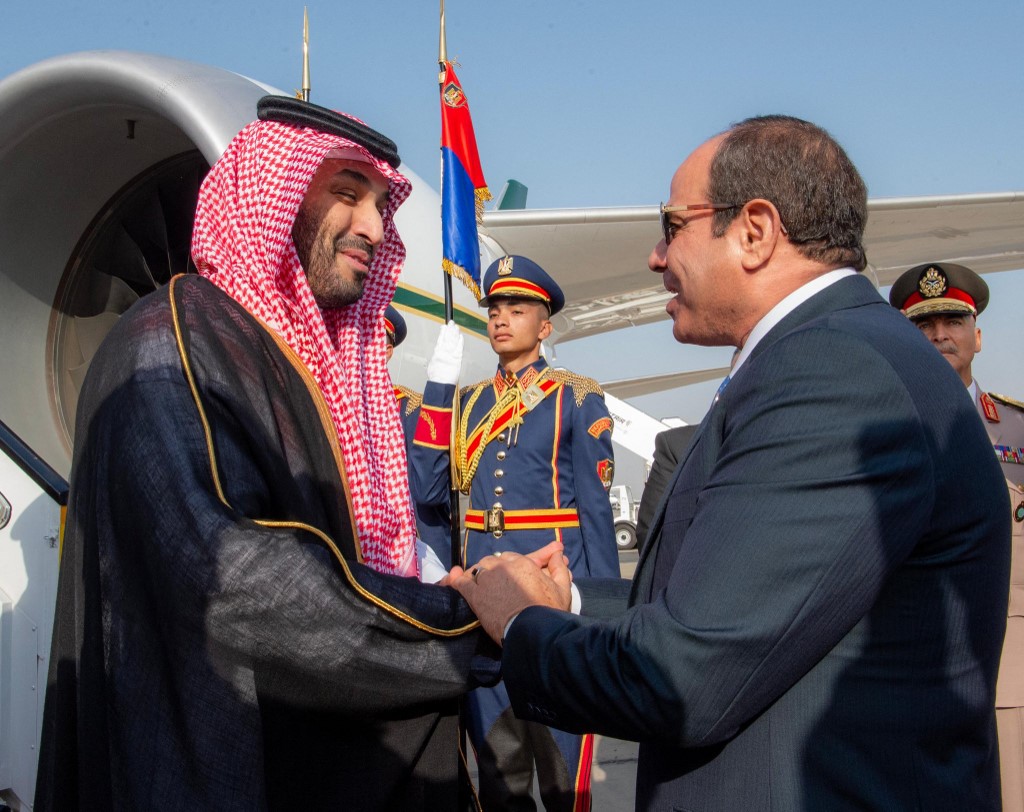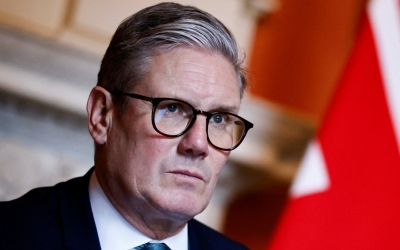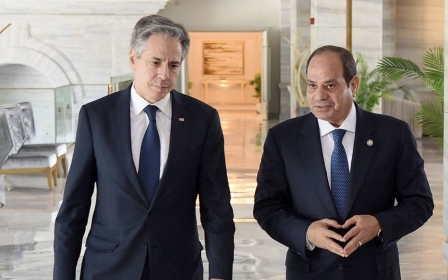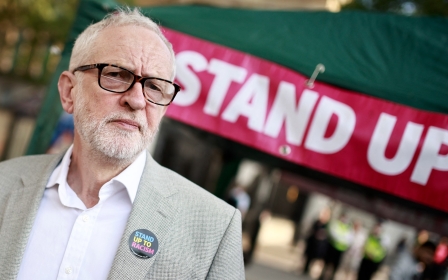A year on, the Palestine solidarity movement must adapt to a widening Middle East war
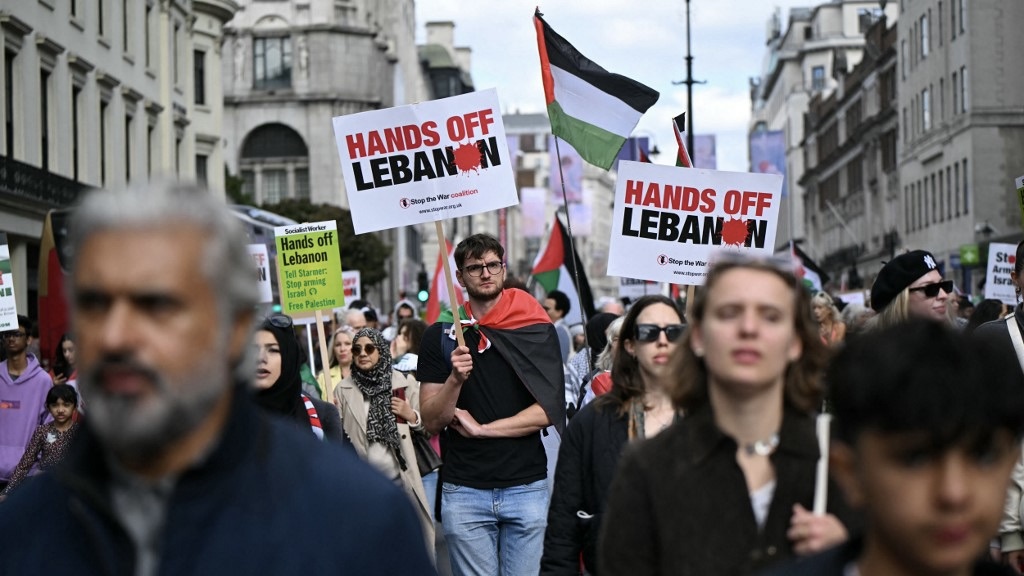
On the first anniversary of Israel's war on Gaza, the Palestine solidarity movement held its 21st national demonstration.
Some 300,000 joined the march, according to organisers, making it one of the largest protests of the past 12 months.
Not that any of the marches have been small by historical standards. The smallest of them was 100,000 strong; the largest, on Armistice Day last year, attracted over 800,000 people.
Certainly, in the pre-Iraq war days, any cause that mobilised 200,000 people, such as the largest of the Vietnam war protests, the poll tax march of 1990 or CND’s 1983 anti-cruise missile demonstration, was considered huge.
But the Palestine movement has transformed the metric because no other cause this century has mobilised so many, so often, over such a short period.
New MEE newsletter: Jerusalem Dispatch
Sign up to get the latest insights and analysis on Israel-Palestine, alongside Turkey Unpacked and other MEE newsletters
There have been other forms of protest, particularly those involving industrial action, that have had dramatic effects: the miners’ strike of 1984-85; the strikes of the early 1970s that brought down the Edward Heath government; the General Strike of 1926; the Great Unrest before the First World War.
But purely in terms of mass street demonstrations, only the Iraq war protests, the suffragettes or the Chartists come to mind.
Imperial powers
However, this historic movement is facing two new challenges: one analytical, the other tactical.
The analytical challenge arises from the transformed nature of the war in the Middle East.
Follow Middle East Eye's live coverage of the Israel-Palestine war
A year ago, Israel’s war was on Gaza alone. Now Israel is intensifying its offensives against Palestinians both in Gaza and the West Bank, against the Lebanese, whose country it has bombed relentlessly and now invaded, and against Syrians and Yemenis, both of whom are being bombed by Israel, and against Iran, a conflict that could become the most serious and consequential of all.
Israel’s ability to begin a regional conflict without serious interdiction by the "international community" is a development which requires explanation.
One commonly heard description of Israel, especially in academic circles, is that it is a settler-colonial society. This description has some virtues in that it draws attention to the external origins of Zionist settlers in Palestine and their colonial and racist attitudes toward the native Palestinians, whom they have driven from their land.
What the settler-colonial description is less good at capturing is the defining relationship between Israel and the major imperial powers, most of all with the United States.
Settler-colonial accounts concentrate on the relationship between Israelis and Palestinians, rooting explanations of Israel’s behaviour in that dynamic. But Israel’s fundamental constitution is as a creation of the imperial powers, and its fundamental function is to police the entire Middle East on behalf of those powers.
In doing this it must, of course, oppress the Palestinians. But, firstly, it could not continue to do this for a week without the existential support it has from the imperial powers.
Put simply, for Israel to remain, in Joe Biden’s words, "the best $3bn investment we make", it must keep the imperial order protected in the entire region.
Arab despots
Of course, Israel’s propagandists want to portray the conflict with other states in the Middle East as part of their struggle to suppress the Palestinians. But this is only partly true.
The main enemy in the escalating war is Iran, because Iran is the only state that has acted as an effective counter to US hegemony in the region. This is not reducible to Iranian support, often exaggerated by western commentators, for the Palestinians.
How damaging this war could be will depend on the other, equally important, cornerstone of US policy in the region: bribing the Arab despots into accepting Israel’s actions.
This two-pronged approach has long been the strategy of US hegemony in the region. In the British Foreign Office, it is codified in the dominant Zionist and subordinate "Arabist" wings of the policy establishment.
In practice, it can be seen in the fact that Israel is funded to act as a watchdog, and the Arab tyrants are funded not to attack Israel. This is why, although Israel is the recipient of the largest amount of US aid, the Sisi dictatorship in Egypt is the second biggest recipient.
The imperial powers want Israel to act in the way it does, and they pay handsomely for it to do so. They would do this whether or not they were lobbied because it fits perfectly with their interests
Again, the settler-colonial description, focused on the internal relationship between Israelis and Palestinians, is less valuable in explaining this wider dynamic between Israel, the Arab rulers and western imperialism.
All of this is also important as an alternative explanation to the often invoked "Israel lobby" account of events. This theory holds that it is the power of the Israel lobby that explains western support for Israel’s actions in the Middle East.
But this reverses that actual line of causality. The imperial powers want Israel to act in the way it does, and they pay handsomely for it to do so. They would do this whether or not they were lobbied because it fits perfectly with their interests: control of trade through the Red Sea and Suez Canal, access to the most profitable oil reserves in the world, valuable arms contracts, etc.
The Israel lobby is real, and it provides PR and ideological support for the imperial project. But it is not the cause of the imperial relationship - rather, the imperial relationship is the sustaining reality of the Israel lobby.
The more extended the war in the Middle East becomes, the more important it is that the anti-war movement has the most convincing analysis available to explain what is happening. Ultimately, the ability to mobilise depends on the ability to interpret events more effectively than one’s political opponents.
'Hate marches'
The second issue is tactical. Every real living movement raises a host of tactical issues, and after a year of unparalleled mobilisation, it would be astounding if such discussions were not arising within the Palestinian solidarity movement, given that the genocide in Gaza has not ended. In fact it has intensified with the Israeli "Generals' Plan" to ethnically cleanse all of northern Gaza.
Currently, the most significant of these discussions is about the relative virtues of direct action and mass mobilisations.
It is untrue, as some direct action supporters claim, that mass mobilisations have been ineffective. They have helped ensure that majority public opinion (69 percent) backs a ceasefire in Gaza and supports a complete arms embargo (56 percent).
They have forced the sacking of the worst home secretary this country has ever seen, Suella Braverman, and successfully defended the right to demonstrate from her attempt to ban or limit it. They have forced the cancellation of 30 of the 350 arms licences that the UK grants to Israel (not enough, but at least as effective as blockading an arms factory for a day).
And they have produced the political environment in which an unprecedented five MPs were elected to parliament on a pro-Gaza ticket. They have continued to pressure the government in an unprecedented manner.
The mass movement necessarily involves far more people and can legitimately claim to represent the wider majority that opposes Israel’s war. Small numbers of direct-action participants cannot so effectively make that claim.
Those arrested for direct action certainly deserve the support of the wider movement, as do the equally large numbers arrested on the demonstrations. But the truth is that the state finds it easier to deal with small numbers involved in law-breaking civil disobedience than it does with mass opposition.
This is why its major ideological offensive for a year has been against "hate marches", why the state licences Zionist and fascist "counter protests", and why the police constantly attempt to control the route and timing of the marches.
All these attempts to control the marches have failed. The movement now needs to defend the right to protest, and to root it more securely in trade union mobilisation.
The trade union movement, with its seven million members, is the only voluntary, progressive movement currently larger than the Palestine movement.
It is not easy to move such organisations, but some real progress has been made over the last year. Participation in the regular workplace days of action is on the increase. They have now won the official backing of Unison, the largest union, and the Trades Union Congress. Workplace action should be a strategic priority for the movement.
The Palestine movement can be - indeed, needs to be - even more effective.
Making it sharper in its analysis, thus keeping pace with the events of the escalating war, and remaining focused on mass mobilisations - which cast a protective umbrella over direct action - is essential.
The views expressed in this article belong to the author and do not necessarily reflect the editorial policy of Middle East Eye.
Middle East Eye delivers independent and unrivalled coverage and analysis of the Middle East, North Africa and beyond. To learn more about republishing this content and the associated fees, please fill out this form. More about MEE can be found here.




